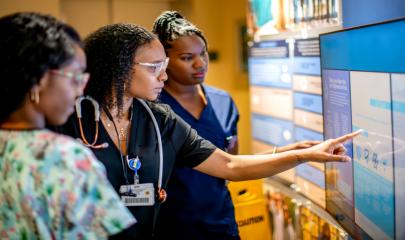Authors
Meredith G. Wesley, Jazmin Duque, Zuha Jeddy, Peenaz Mistry, Abt Global; Vic Veguilla, Ashley L. Fowlkes, Michael Daugherty, Ashton Dixon, Melissa A. Rolfes, Mark Thompson, Fatimah S. Dawood, Centers for Disease Control and Prevention; Adam Bissonnette, Jennifer Meece, Marshfield Clinic Research Institute; Shawn Beitel, Jefferey L. Burgess, University of Arizona; Manjusha Gaglani, Baylor Scott and White Health, Texas A&M University; Christina A. Porucznik, Sarang K. Yoon, Joseph B. Stanford, Andrew L. Phillips, University of Utah; Melissa S. Stockwell, Columbia University; Harmony L. Tyner, St. Luke’s Regional Health Care System; Allison L. Naleway, Holly C. Groom, Kaiser Permanente Northwest Center for Health Research; Alberto J. Caban-Martinez, Natasha Schaefer-Solle, University of Miami; Marilyn Odean, St. Luke’s Regional Health Care System, The Whiteside Institute for Clinical Research
A paper Abt Global coauthored shows that COVID-19 specimen-collection methods other than traditional nasal swabs are accurate in detecting SARS-CoV-2 infections. SARS-CoV-2 is the virus that causes COVID-19 illness. A variety of options for testing is critical because of global supply shortages faced during a public health emergency such as a pandemic.
Abt Global, which collects data on COVID-19 transmission and vaccine effectiveness for the Centers for Disease Control and Prevention (CDC), explored several approaches. The normal protocol, the gold standard for testing for this type of virus, was to use traditional, soft-tipped nasal swabs. Study participants placed them in tubes with liquid and sent them in for analysis. The other methods Abt tested were saliva put in cups and foam-tipped swabs put in empty tubes.
Participants with at least one COVID-19 symptom from three CDC-sponsored studies provided specimens for all three collection methods. The results showed that saliva and foam-tipped swabs provided the sensitivity and specificity (true positives and true negatives) required. The analysis showed 97 percent positive results for soft-tipped swabs, 99 percent for saliva, and 89 percent for foam-tipped swabs.
The specimens came from 1,900 participants in three studies: the Abt-led Coronavirus Household Evaluation and Respiratory Testing C-HEaRT and Research on the Epidemiology of SARS-CoV-2 in Essential Response personnel studies and the University of Arizona’s Arizona Healthcare, Emergency Response, and Other Essential Workers Surveillance study. They produced more than 4,000 specimens. The paper’s merger of data from three studies shows the value of carrying out different studies using similar protocols.




